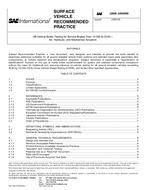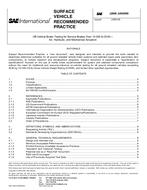Subject document is specifically intended for service brakes and service brakes when used for parking and/or emergency brakes (only) that are commonly used for automotive-type, ground wheeled vehicles exceeding 4536 kg (10 000 US lb) Gross Vehicle Weight Rating (GVWR). Subject specification provides the off-vehicle procedures, methods, and processes used to objectively determine suitability of tactical and combat ground wheeled vehicle brake systems and selected secondary-item brake components (a.k.a. aftermarket or spare parts), including brake “block†for commercial applications only, specifically identified within subject document. Subject specification is primarily based on known industry and military test standards utilizing brake inertia dynamometers. Targeted vehicles and components include, but may not be limited to the following:
-
Civilian, commercial, military, and militarized-commercial ground wheeled vehicles such cargo trucks, vocational vehicles, truck tractors, trailers, specialized support and engineering equipment under the generic heading of Ground Vehicle “Dry†Brake Systems (GVDBS).
-
Hydraulic, air, and mechanical “dry†disc brake and drum brake systems when used as service brakes, including service brakes (only) when used as emergency and/or parking brakes.
-
Hydraulic, air, and mechanical “dry†disc brake pad assemblies and rotor assemblies.
-
Hydraulic, air, and mechanical “dry†drum brake shoe assemblies and drum assemblies.
-
Hydraulic, air, and mechanical brake “block†when intended for use on a. thru d. above except for those vehicles, pad assemblies, and shoe assemblies specifically procured for military use and/or tested under ATPD-2354. It must be noted that such the US Government’s Military Services buys only assemblies and doesn’t normally use “brake block†and relined brake shoes/pads, therefore testing using separate brake “block†was specifically excluded from ATPD-2354 by the original authors.
Product Details
- Published:
- 06/01/2009
- File Size:
- 1 file , 520 KB

